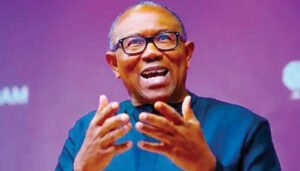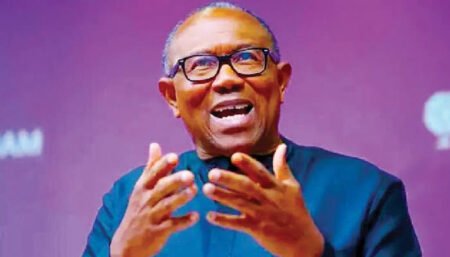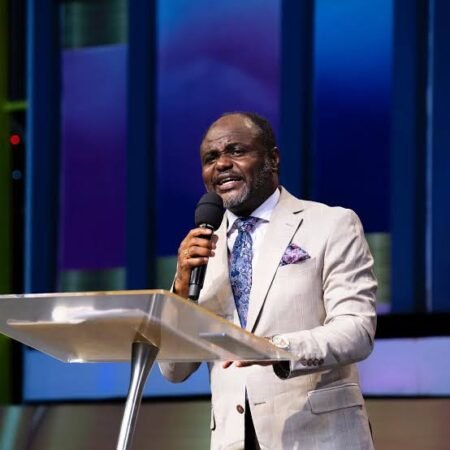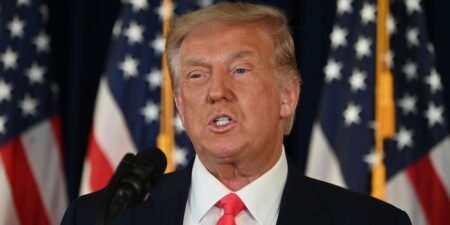Governor Chukwuma Soludo has sparked controversy by promising cash reward for every ward won by his party, the All Progressives Grand Alliance, in the upcoming November 8 Anambra governorship election.
Soludo pledged N1 million to his party followers at a campaign event in Umunze, Orumba South Local Government Area, on Saturday.
Soludo said, “When we were campaigning for the Senate, we knew we were going to win every ward in the South Senatorial Zone, but we still had some incentives. Any ward that APGA won received N1m, and we won all the wards in Orumba South.
“We promised each of these wards N1m, and next week, we will redeem it. The ward that comes first will get N5m, the second N3m, and the third N2m. That was the deal. For November 8, any ward that wins again will receive N1m, while the first three performing wards will get N5m, N2m, and N1m, respectively.”
Opposition kicks
The pledge sparked criticism from opposition parties and civil society organizations, which saw it as an open enticement and a clear breach of the Electoral Act.
The poll, in which 16 political parties and their candidates will compete for the governorship seat, is projected to draw over 2.8 million registered voters.
Prof. Joash Amupitan, the recently appointed Chairman of the Independent National Electoral Commission, stressed the importance of the Anambra election in strengthening the country’s democracy.
Dr. Ijeomah Arodiogbu, the National Vice Chairman of the All Progressives Congress in the South-East, described Soludo’s actions as vote-buying and abuse of office.
“Clearly, this is vote-buying and against the electoral law. Soludo has been carrying out undemocratic activities in this election. He has been forcing communities to commit their votes through their leaders.
“The N1m offer is just one of many. We will write to INEC, EFCC, the police, and other relevant security agencies about his actions,” Arodiogbu said.
Similarly, Mallam Bolaji Abdullahi, ADC’s National Publicity Secretary, urged INEC to act quickly, calling Soludo’s vow “a public confession of vote-buying.”
The Labour Party also chastised the governor, accusing him of weaponizing poverty.
“This is not good for democracy. Why is he giving out money now that elections are near? This is vote-buying and manipulation. He has failed in governance and now wants to buy legitimacy with money. We will raise this matter at the next stakeholders’ meeting with INEC,” LP’s National Publicity Secretary, Obiora Ifoh, said.
Mike Ahumibe, a former Zonal Organizing Secretary of the Peoples Democratic Party, also criticized the development, claiming it threatened voting integrity.
He said, “Once there is money involved, it is no longer free and fair. Elections should be about the people’s choice, not about who can pay the most.”
INEC must act – CSOs
Furthermore, various civil society organizations regarded the governor’s promise as risky.
Debo Adeniran, executive director of the Centre for Anti-Corruption and Open Leadership and a rights campaigner, stated that Soludo’s actions had institutionalized vote-buying and monetized the state’s electoral process.
Adeniran said, “This is reprehensible. The governor of a state should be a shining example of good behavior. Vote-buying is an electoral crime for which the governor could be tried once he relinquishes his immunity. It is a way of instigating the people against the law.
“What he has done amounts to electoral indiscipline and a criminal act. The authorities should stop him.
“INEC, under Amupitan, should take exceptional notice of it and apply the appropriate section of the law to discipline the governor. His immunity doesn’t cover electoral offenses.”
Alhaji Yabagi Sani, a former National Chairman of the Inter-Party Advisory Council, agreed that the governor’s move set a hazardous precedent that could undermine democratic norms.
He said that the remark was an obvious attempt to commercialize the voting process, which might promote electoral fraud and erode public trust in government.
Sani urged INEC, the police, and the EFCC to examine the statement and suggested that a formal letter be addressed to him to clarify his views.
He said, “It will have a lot of negative influence on politics because it means he has openly commercialized the election, and that is clear rigging.
“The money he’s talking about is the people’s money, which he wants to use to win the election because others do not have access to it. Even if they did, it’s not a good practice at all. That’s a bad idea for democracy.
“They preach against the use of money in elections, yet some of these people are commercializing the process to gain advantage.
“I think INEC, the police, and EFCC should also ask him to explain his statement. A letter should be sent to him to clarify why he made such a remark because it runs contrary to the laws of the land.”
Furthermore, YIAGA Africa, an election monitoring organization, branded Soludo’s promise as a threat to democracy.
In an interview with Sunday PUNCH, YIAGA Africa’s Media and Communication Officer, Jennifer Dafwat, urged for harsher penalties for politicians discovered indulging in vote-buying.
Dafwat said Soludo’s statement underscored a long-standing issue in Nigeria’s political system, in which incentives and material rewards are utilized to sway voters’ decisions well before election day.
She said, “Vote-buying is not limited to the act of exchanging money on election day. It includes any form of incentive meant to sway people’s decisions in favor of a candidate. What Governor Soludo said clearly falls within that category.”
She explained that such offers take advantage of widespread poverty and hunger, transforming elections into transactions rather than debates about ideas and competencies.
Anambra govt denies allegations.
In response to the charges, Anambra State Commissioner for Information, Dr. Law Mefor, denied the claims of vote-buying, describing the governor’s promise as a simple act of encouragement to energize supporters.
The commissioner accused opposition parties of purposeful mischief, claiming that the governor’s comments were taken out of context.
“How does motivation for supporters amount to vote-buying? I don’t see how this amounts to selling and buying votes, even if it’s true.
“Vote-buying, in my view, is the act of purchasing votes. A vote must be priced and bought; that’s vote-buying. So, how many votes has Soludo purchased by such a promise?” he queried.
Speaking further, he said, “Though I didn’t hear the governor say it, I don’t see anything wrong with a leader motivating his supporters. We have two forms of motivation, intrinsic and extrinsic. Extrinsic motivation is material reward, which could be monetary.”










